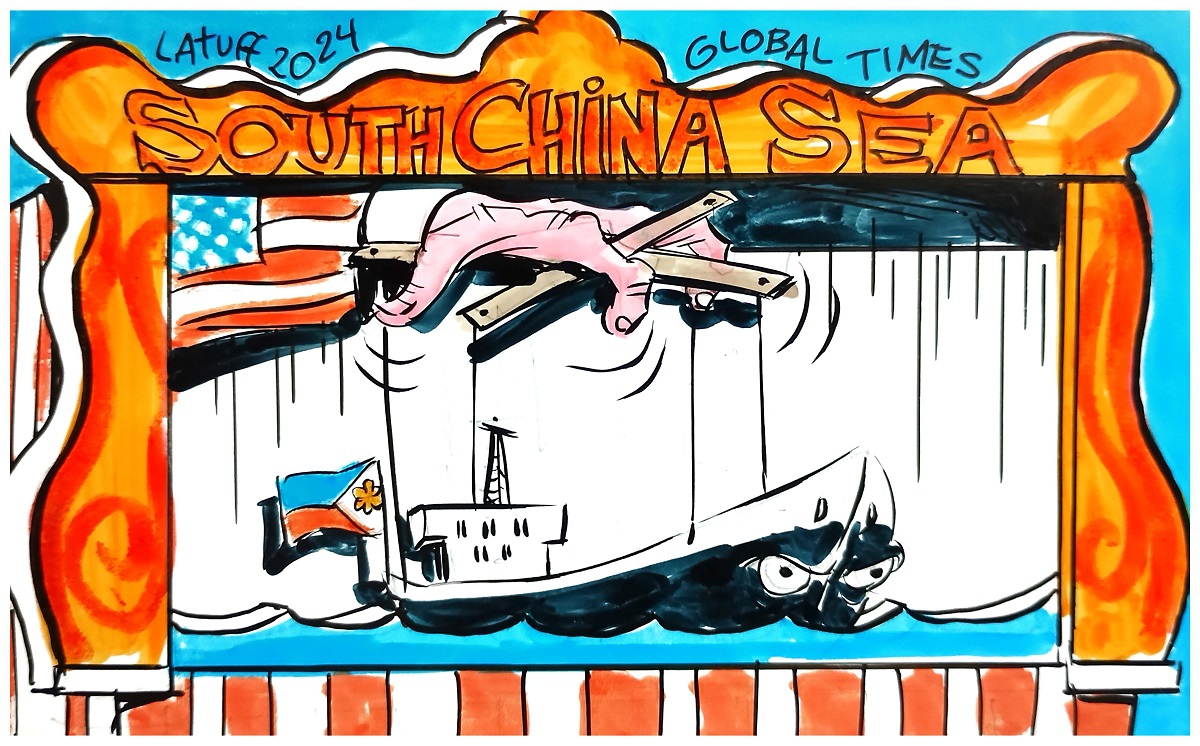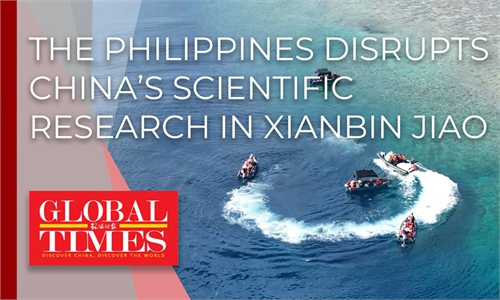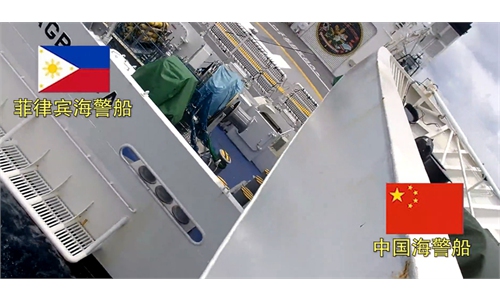Regional countries should be particularly vigilant about US-Philippines provocations in South China Sea

Puppet show. Cartoon: Carlos Latuff
The head of US Indo-Pacific Command, Admiral Samuel Paparo, said recently that the US could escort Philippine resupply missions in the South China Sea. On the Philippines side, Philippine Defense Secretary Gilberto Teodoro urged a broader interpretation of the Mutual Defense Treaty with the US.This remark highlights the Philippines' impulsive tendency, spurred by the US, to further escalate maritime tensions and intensify friction. The Philippine defense chief said that China is "the biggest disruptor" of peace in Southeast Asia and calls on the international community to strongly condemn its "aggression" in the South China Sea. Yet what regional countries truly need to watch out for is the impact of US-Philippines provocations on peace and stability in the waters.
The Mutual Defense Treaty between the US and the Philippines is a relic of the Cold War, and the disputes between China and the Philippines have nothing to do with the US. The US periodically brings up the treaty, partly to endorse the Philippines' illegal claims and provocative actions in the South China Sea, and partly to maintain the stability of the US-Philippines alliance through a reassurance mechanism. Ultimately, the US seeks to control the direction of the US-Philippines alliance. The US approach may not directly threaten China, but it can lead to the Philippines feeling worried about being left alone, thereby discouraging Manila from exploring other options for resolving its issues. This tactic allows the US to keep the Philippines aligned with its strategic interests, although it will not genuinely prioritize Manila's concerns on critical matters.
The Marcos Jr administration has closely aligned the Philippines with the US, a move that not only threatens the peace and stability of the South China Sea but also intensifies the militarization of the Philippines and the wider region. In fact, the Marcos administration's ongoing provocations at China's Xianbin Jiao, Ren'ai Jiao and Huangyan Dao also intend to test the extent of the so-called US' promised support. The Philippine intention of reverse kidnapping the US through provoking frictions in the South China Sea cannot be ruled out, either.
Given the Philippines' typical tactics, it is likely to continue attempting illegal resupply operations and spreading false information in the media to deceive its domestic audience and mislead the international community. However, such premeditated provocations aimed at testing China's resolve to uphold its territorial sovereignty will only lead to the Philippines being humiliated. The situation at the Xianbin Jiao is a clear example. China's current measures remain restrained, professional and relatively mild, which is already causing significant difficulties for the Philippines. If the Philippines continues its provocations, it can expect even stricter on-site control measures in response.
Based on historical experience and regional practice, the US has used South China Sea disputes to create friction among the parties involved, turning the maritime domain into a battleground for unilateral hegemony and great-power rivalry. By forming exclusive "small groups," the US seeks to drag Southeast Asia into bloc politics and confrontations. Its efforts to use "minilateral" security mechanisms to contain and deter China could lead to increased maritime conflicts and a greater military presence in the South China Sea.
The Philippines relying on external powers for its own interests may ultimately result in negative consequences for itself, and these adverse effects could potentially spill over into the region. ASEAN countries, in particular, need to stay vigilant and resist such actions.
As the largest coastal state in the region, China must take effective measures to protect its sovereignty, security and development interests. In recent weeks, the Philippines' numerous attempts to resupply its illegally stationed coast guard vessel at the Xianbin Jiao have all failed, due to China's effective management. After each maritime incident, China has actively provided detailed information to clarify what actually happened. This information serves to show that the Philippines is the one causing problems, acting provocatively, and creating disturbances.
China's comprehensive maritime measures have strongly countered and deterred the Philippines' provocations. This should make it clear to the Philippines that China is resolute in defending its territorial sovereignty. It should also demonstrate to ASEAN countries China's firm commitment to upholding the seriousness of the Declaration on the Conduct of Parties in the South China Sea.
The author is a deputy director of the Institute of Maritime Law and Policy at China's National Institute for South China Sea Studies. opinion@globaltimes.com.cn


